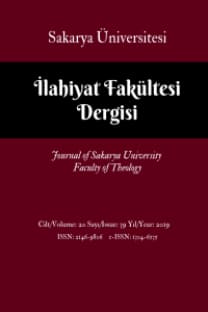İ BNÜ'L-MÜNECC İ M (241-300/ 855-912) ve R İ SÂLE F İ ’L-MÛSÎKÂ ADLI ESER İ
Ibn al-Munajjim lived in Abbasid Era in which music became a branch of science inIslamic Civilization. He wrote two valuable books on the theories of music. He came from“Müneccimoğulları family” known by its affinity to palace, and he was also an authority inArabic-Persian sciences. His teacher Ishâq al-MawsılÄ« was considered as the founder of thetheories of music in Islamic world; but his Works didn't reach us. And this increased thevalue of al-Munajjim's work, because his Risâla fi'l-MûsÄ«qâ gives detailed and importantinformations about the theories of music of that period. In researches on history of musicdone in western and Arab world Ibn al-Munajjim's Risâla was mistakenly mixed up by hiswork Kitâbu'n-Nagam. In this study we tried to connect this misunderstanding and weexamined Ibn al-Munajjim's –and consequently his teacher Ishaq's- theories of music. Wealso tried to give some informations about the life of Ibn al-Munajjim.
Anahtar Kelimeler:
İbnü’l-Müneccim, Risâle fi’l-Mûsîkâ, Kitâbü’n-Neğam
IBN AL-MUNAJJIM (241-300 / 855-912) AND HIS WORK RIS Ā LA FI’L-M Ū S Ī K Ā
Ibn al-Munajjim lived in Abbasid Era in which music became a branch of science inIslamic Civilization. He wrote two valuable books on the theories of music. He came from“Müneccimoğulları family” known by its affinity to palace, and he was also an authority inArabic-Persian sciences. His teacher Ishâq al-MawsılÄ« was considered as the founder of thetheories of music in Islamic world; but his Works didn't reach us. And this increased thevalue of al-Munajjim's work, because his Risâla fi'l-MûsÄ«qâ gives detailed and importantinformations about the theories of music of that period. In researches on history of musicdone in western and Arab world Ibn al-Munajjim's Risâla was mistakenly mixed up by hiswork Kitâbu'n-Nagam. In this study we tried to connect this misunderstanding and weexamined Ibn al-Munajjim's –and consequently his teacher Ishaq's- theories of music. Wealso tried to give some informations about the life of Ibn al-Munajjim.
Keywords:
Ibn al-Munajjim, Ris ā la fi’l-M ū s ī q ā, Kit ā bu’n-Nagam,
___
- Babanzade Bağdatlı İsmail Paşa (ö.1920), Hediyyetü'l-ârifin esmâi'l-müellifin ve âsârü'lmusannafin (trc. Kilisli Rifat Bilge; tashih İbnülemin Mahmud Kemal İnal, Avni Aktuç), I-II, Ankara 1955,
- Hatîb el-Bağdâdî, Ebû Bekir Ahmed b. Ali (ö. 463/1071), Târîhu Bağdâd, I-XIV, Kahire 1931.
- Brockelmann, Carl, Geschichte der Arabischen Litteratur (GAL), I-II, Leiden 1943-1949.
- Çetin, Nihad M., “Arûz”, DİA, III (İstanbul 1991), s. 424-437.
- Ebü’l-Ferec el-Isfahânî, Ali b. el-Hüseyin (ö. 356/967), Kitâbü’l-Eğânî (nşr. Abdülemir Mühenna-Semîr Yusuf Cabir), I-XXIV, Beyrut 1986.
- el-Enbârî, Ebü'l-Berekat Kemaleddin Abdurrahman b. Muhammed Enbari, (ö. 577/1181), Nüzhetü’l-Elibbâ fî tabakâti’l-üdebâ, Zerka 1985.
- Farmer, Henry George, Historical Facts For The Arabian Musical Influence, Newyork 1970.
- ______ Masâdiru’l-Mûsîkâ’l-Arabiyye, (trc. Hüseyin Nassâr), Kahire 1957.
- ______ Târihu’l-Mûsîkâ’l-Arabiyye, (trc. Hüseyin Nassâr), Kahire 1956.
- ______ “Yahyâ b. Ali”, İA, XIII (İstanbul 1986), s. 347.
- el-Hamevî, Ebu Abdullah Şihabüddin Yakut b. Abdullah Yâkût (ö. 626/1229), Mu‘cemü’l-Üdebâ (nşr. Ahmed Ferîd Rifâî), I-XX, Beyrut ts.
- İbn Hallikân, Ebü’l-Abbas Ahmed b. Muhammed (ö. 681/1282), Vefeyâtü’l-a‘yân ve enbâü ebnâi’z-zaman, (nşr. İhsan Abbas), I-VIII, Beyrut 1978..
- İbnü’l-Kıftî, Cemaleddin Ali.b. Yusuf (ö. 646/1248) İhbâru’l-ulemâ bi-ahbâri’lhukemâ:Târîhu’l-Hukemâ (nşr. I. Lippert), Leipzig 1903.
- Yahya b. Ali b. El-Müneccim (ö. 855/912), Risâletü’bni’l-Müneccim fi’l-Mûsikâ ve keşfi rumûzi kitâbi’l-eğânî (tah. Yusuf Şevki), Kahire 1976.
- ________ “Kitabu’n-Neğam” (trc. Ruhi Kalender, Necati Avcı), Ankara Üniversitesi İlahiyat Fakültesi Dergisi, XXV (Ankara 1981), s. 396.
- İbnü’n-Nedîm, Ebü’l-Ferec İsmâil b. İshâk (ö. 385/995), el-Fihrist, Tunus 1985.
- Kâtib Çelebi (ö. 1067/1657), Keşfü’z-zünûn an esâmi’l-kütüb ve’l-fünûn, I-II, Tahran 1967.
- Kehhâle, Ömer Rıza, Mu’cemü’l-Müellifin, I-XV, Dımaşk 1957-1961.
- Khairalah, E. A., “Abu Ahmad Yahyâ”, The Encyclopaedia of Islam (New Edition), I (London 1983), s. 251.
- el-Merzubânî, Ebu Ubeydullah Muhammed b. İmran b. Musa Merzubani (384/994), Mu’cemü’ş-Şuarâ (tashih; Fritz Krenkow), Beyrut 1982.
- Ronart, Stephan and Nancy, “Yahyâ ibn Ali ibn Yahyâ”, Central Asiatic Journal (CAJ), Wiesbaden-Den Hague 1959, s. 563.
- Shiloah, Amnon, The Theory of Music in Arabic Writings, München 1979.
- Stern, S. M., “Abu Isa ibn al-Munajjim’s Chronography”, Islamic Philosophy and the Classical Tradition, 1972, s. 437-466.
- Suad b. Abdilaziz, “el-Musikûru’l-İslâmî Ziryâb”, Mecelletü’l-Müerrihi’l-Arabî, XXII (Bağdat 1982), s. 153.
- et-Taberî, Muhammed b. Cerir (ö. 310/922), Tarihu’r-Rusül ve’l-Mülûk (nşr. Muhammed Ebü’l-Fazl), I-XI, Kahire 1990.
- Turabi, Ahmet Hakkı, el-Kindî’nin Mûsikî Risâleleri, (Basılmamış Yüksek Lisans Tezi), Marmara Üniversitesi Sosyal Bilimler Enstitüsü, İstanbul 1996.
- el-Yâfiî, Afifüddin Abdullah b. Es’ad b. Ali el-Yemâni (ö. 768/1366), Mir'atü'l-cenân ve ibretü'l-yakzân fi ma'rifeti havâdisi'z-zemân (thk. Abdullah Muhammed Cuburi), I-IV, Beyrut 1970-84.
- Yılmaz, Saim, Abbâsîlerde Mu‘tazıd ve Müktefî Dönemi (279-295/892-908), (Basılmamış Doktora Tezi), Marmara Üniversitesi Sosyal Bilimler Enstitüsü, İstanbul 2004.
- Yusuf, Zekeriya, Mahtûtâti’l-Mûsîkâ’l-Arabiyye fi’l-Âlem (Pakistan), Bağdat 1967.
- _____ Risâletü’bnü’l-Müneccim fi’l-Mûsîkâ, Kahire 1964.
- ez-Zehebî, Şemseddin Muhammed b. Ahmed (ö. 748/1348), Siyeru a’lâmi’n-nübelâ (nşr. Şuayb el-Arnaût v.dğr.), I-XXIII, Beyrut 1981-1985.
- ez-Zirikli, Hayreddin, el-A‘lâm, I-XI, Kahire 1954-1959.
- ISSN: 2146-9806
- Yayın Aralığı: Yılda 2 Sayı
- Başlangıç: 2001
- Yayıncı: Sakarya Üniversitesi
Sayıdaki Diğer Makaleler
I. AHİ EVRAN-I VELİ VE AHİLİK ARAŞTIRMALARI SEMPOZYUMU'NDAN İZLENİMLER
Ebû Bekir Razî'nin Ahlak Felsefesi
KAĞIDA İŞLENEN UYGARLIK- Kağıdın Tarihi ve İslam Dünyasına
İ BNÜ'L-MÜNECC İ M (241-300/ 855-912) ve R İ SÂLE F İ ’L-MÛSÎKÂ ADLI ESER İ
SURİYELİ ŞAİR BEDEVÃŽ EL-CEBEL ve “ELLİ YAŞ” ADLI ŞİİRİ
SON DÖNEM OSMANLI ALİMLERİNDEN MEHMED ZİHNİ EFENDİ'NİN HAYATI VE ESERLERİ
HALİFE MU'TAZID DÖNEMİNDE (279-289/892-902) ABBSÃŽ-TOLUNOĞULLARI İLİŞKİLERİ
Tahirü'l-Mevlevî ve CENGİZ VE HÜLGÛ MEZLİMİ Adlı Eseri
